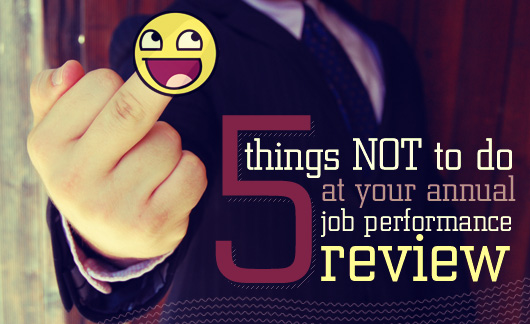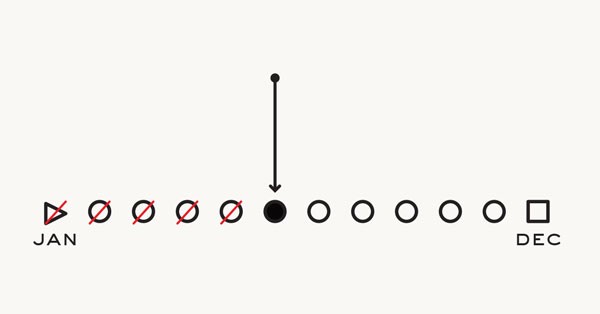Certain things are unavoidable in December: Lame Secret Santa gifts, post-holiday party hangovers, and – perhaps the most dreaded one of all – your end-of-year performance review at the office. We’ve all been there and survived, and you will too. Just steer clear of these five definite don’ts, and watch your annual review go down as smoothly as that third cup of eggnog.
5 Things Not to Do at Your Annual Job Performance Review:
Show up unprepared.
You have a full year of work behind you, and this is your chance to show what you’ve accomplished in the past 365 days. Sit down in the days before your review and make a list of your achievements this year – successful projects, areas of growth, and any new skills you’ve acquired. Come to your review with a folder documenting your strengths. Be ready to talk up the ways you excelled in the past year, and have some ideas for improving even more in the year to come.
Get defensive.
Even the most positive annual review will contain some constructive – or not so constructive – criticism. Some of it may be justified, and some of it may seem like it’s designed to crush your ego. The higher-ups delivering your review will be paying attention to how you react to their critique. “Before you even open your mouth, be attentive to what your body language is saying,” advises executive presentation and speech coach Kayla Schwartz. Schwartz recommends aiming for an open and receptive physical stance: uncross your arms, lean slightly forward, and keep a neutral facial expression rather than a scowl or frown.
React too quickly.
You’ll probably receive a lot of information at your review, and some of it may take time to process. The best thing to do is to listen carefully. “When your reviewer makes a comment, reflect it back, showing you understand,” says Schwartz. “That can also defuse the intensity of any emotional response you may have.” Take notes on what’s being said and look them over later when you’re more relaxed. Then ask your manager if you can schedule a follow-up meeting to discuss his comments further once you’ve had more time to think.
Be discouraged.
If your annual review is less than stellar, try not to take it personally. Your first years in the workforce are a learning period, and you’ll make many mistakes before you land that corner office. Don’t let the opinion of one boss define your self worth. Remember that long before the first million pairs of Mickey Mouse ears were sold, Walt Disney was fired by a newspaper editor who complained that he “lacked imagination.”
Rest on your laurels.
If your review was glowing, congratulations – you’ve done great this year. But now is not the time to take it easy. “Once the cycle is complete, your manager might be perfectly happy to forget about your performance for the next five or 11 months,” warns Alexandra Levit, author of They Don't Teach Corporate in College: A Twenty-Something's Guide to the Business World. “Don’t let her. Be proactive about setting up regular meetings to review your progress, address potential problems, and incorporate new responsibilities and priorities into the master plan. If you keep the lines of communication open, nothing that comes up in your next review will be a surprise.” Read Primer's interview with Alexandra Levit on other business things they don't teach in college.

















